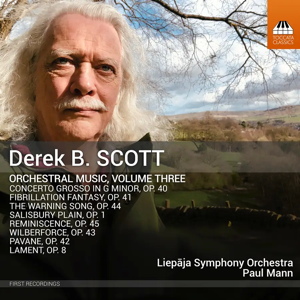
Derek B. Scott (b. 1950)
Orchestral Works, Volume Three
Wilberforce: Tone-Poem, Op. 43 (1983/2022)
Salisbury Plain: Fantasy for Horn and Orchestra, Op. 2 (1972/2022)
Lament, Op. 8 (1977, rev. 2022)
Fibrillation Fantasy, Op. 41 (2022)
Pavane, Op. 42 (2022)
The Warning Song: Tone-Poem, Op. 44 (1985/2022)
Reminiscence: Rondo for Orchestra, Op. 45 (1971/2022)
Concerto grosso in G minor, Op. 40 (1972/2021)
Liepāja Symphony Orchestra/Paul Mann
rec. 2023, Great Amber Concert Hall, Liepāja, Latvia
Toccata Classics TOCC0700 [71]
Toccata tells us that “Derek Scott […] has an international reputation as a historian of the British music hall and other forms of light entertainment” – I suspect that may include television and film scores, although they aren’t specifically mentioned.To my mind, his compositions are most successful when they do not remind us of that!
The tone-poem Wilberforce, unfortunately, gets things off to the wrong start. The opening churning in triplets grabs the attention; expressive soli for horn, oboe, and clarinet lead to a fuller, string-based sonority and then to a quicker, rhumba-like passage. Everything sounds fine, but none of it fits together: it’s “bitty,” like an attempt to string together disparate bits of film music into a suite. Two tracks later, the Lament, in which an unrelated ominous, agitated episode interrupts the graciously Romantic string chords, has the same problem. The more lightly scored bits offer nice contrasts of colour and texture, but the piece ends “up in the air,” unresolved.
Offering the listener some hope between those two items is the Fantasy Salisbury Plain for horn and orchestra. It begins with quiet horn calls, answered by searching string phrases; the strings gradually take over the proceedings with an American-postwar sound.
And, once past the first and third tracks, the music is of markedly better quality, coherent and expressive. The Fibrillation Fantasy, inspired by the composer’s own fibrillation episode, may seem a bizarre idea, but the five-minute piece is one of the best in the program. The gently anxious pulsing at the start gradually becomes more emphatic. After a brief, mildly dissonant climactic chorale. the pulses returns, quietly, with longer woodwind phrases arching over them. The score’s concision and rhythmic profile reminded me, again, of the postwar American symphonists.
The Warning Song proffers another questioning start; the graceful duple passage seems unrelated to the dreamy English-horn-over-harp episode, but the transitions are smooth, and it all sort-of-works. The rondo Reminiscence starts quietly and grandly, settling into lighthearted triplets, proceeding in short musical periods.
When Scott nominally emulates older forms, the resemblance isn’t always immediately clear. In the Pavane, the wind chords – some high-and-sweet, some low-and-lumbering – and a serious, ambivalent string chorale didn’t sound like any sort of pavane. The snare drum’s entry, however, suggests a medieval court dance, and the rest of the piece grows into itspastiche persona.
The four-movement Concerto Grosso is more to the point, after an opening Grave where questing lines answer each other. The second movement, a Passacaglia launched in the bass, turns unexpectedly cheerful. After a sombre, pensive Larghetto, a lively yet severe fugato closes the piece.
Paul Mann and his Latvian players have the measure of the music; the horn solo in Salisbury Plain is particularly lovely. Neither can you fault the engineering: even in the disjointed Lament, the various wind soli reproduce with lovely colour and depth. On balance, I rather liked this.
Stephen Francis Vasta
stevedisque.wordpress.com/blog
Previous review: Jonathan Woolf (September 2023)
Help us financially by purchasing from




















